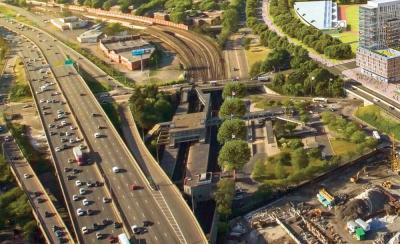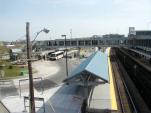July 16, 2015
 JFK: JFK-UMass station from above
JFK: JFK-UMass station from above
If Boston wins the bid to host the 2024 Summer Olympic Games – and if local elected officials can win enough political support – a $50 million upgrade would transform one of Dorchester’s key transportation hubs.
JFK/UMass station hosts inbound and outbound stops to the Ashmont and Braintree on the Red Line, a stop on the South Shore commuter rail line, four bus lines, and a bus shuttle to and from nearby UMass Boston and the JFK Library.
A rehab of the station to expand its bus capacity and create a second, raised, bus platform at Columbia Road would eliminate a turnaround that now sends buses through Koscziusko Circle, Boston 2024 CEO Rich Davey told the Reporter in an interview on Tuesday.
If the Games come to pass, JFK/UMass Station would be a key pick-up and drop-off point for those staying at the Athletes Village on Columbia Point who would be shuttled to venue locations on buses traveling on Olympic Lanes throughout the city and state, as well as for spectators coming to check out the Village.
“Our thinking is that you can build a new bus deck at Columbia Road with a transition ramp down to Morrissey,” Davey said, adding that conceptual plans include an entrance, or head house, on Columbia Road that would eliminate the need for buses to travel through Koscziusko Circle down to Morrissey Boulevard to pick up and drop off passengers. “We can modify existing head houses to connect to the upper level of the station and improve passenger circulation,” said Davey.
The price of a JFK/UMass Station upgrade would be a quarter of the cost of rehabbing two other T stations that might be affected by Games. Backers have proposed a new $100 million Fairmount Line station at Widett Circle, which would be funded by a master developer who would be charged with building out the parcel needed for the main Olympic Stadium. The Broadway MBTA Station could also see a $100 million fix-up as part of the overall Olympics picture.
The current JFK/UMass station – formerly known as Columbia Station – was updated back in 1988 when the authority added a platform for the Braintree Red Line branch and a new head house. Previously, South Shore-bound trains did not stop in Dorchester, but went straight to Quincy. That fix cost $13.5 million. In 2001, the MBTA added a third platform for the commuter rail lines to the South Shore.
The much more elaborate reconstruction envisioned by Boston 2024 planners would center on the station’s infrastructure for buses.
 JFK Station
JFK Station
“We are really focused on the bus side of the service,” said Davey, with an emphasis on “keeping in mind” previous upgrades to the commuter rail service, additional Red Line cars, and power and signal upgrades along the line. It is still not fully clear how these upgrades would be paid for. When Boston 2024 unveiled its re-worked plan – dubbed “Bid 2.0” – the organization stated that “funding for permanent public transportation infrastructure, such as improvements to Koscziusko Circle, and the upgrade to JFK/MBTA station, would be funded by commonwealth infrastructure funds provided by public authorities.”
The Legislature would be the key to securing the funding, which could be included as part of a larger package set aside for transportation improvements around the Olympic Games. The MBTA itself could also budget for the build-out.
“If it’s funded by the T, it doesn’t have to be a part of the bond bill,” Davey said. “Certainly, it’s a project that we’re recommending the MBTA take on.”
So far, the MBTA has demurred on the proposal, signaling that it will wait to see findings from Gov. Charlie Baker and the independent Olympic consultants hired by Baker, Senate President Stanley Rosenberg, and House Speaker Robert DeLeo.
“The MBTA is pleased that Boston 2024 has put forward a far more extensive plan and we look forward to working with the experts Gov. Baker has tapped to thoroughly examine that plan,” said the T’s Joe Pesaturo in a statement on Monday. The consultants are expected to release their report on Bid 2.0 later this summer.
An upgrade to the JFK/UMass bus platform was not in the MBTA’s pipeline, according to Pesaturo, who noted that there is “ongoing maintenance and repair work but no significant improvements planned at this time.”
Villages:
Topics:



